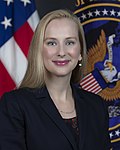History
The idea of a center to merge intelligence on terror threats was proposed by the 9/11 Commission following the completion of its investigation into the September 11 attacks, the deadliest terrorist attack in world history. [6] Plans to create such a center were announced by President George W. Bush in his January 2003 State of the Union address. On May 1, 2003, Executive Order 13354 established the Terrorist Threat Integration Center (TTIC). [7] [8]
In 2004, the center was renamed the NCTC and placed under the director of national intelligence by the Intelligence Reform and Terrorism Prevention Act.
After the Christmas 2009 terrorist attempt on Northwest Airlines Flight 253, the NCTC was tasked with creating a process to "thoroughly and exhaustively" prioritize terrorism threat threads; identify follow-up action by intelligence, law enforcement, and homeland security; and enhance the "Terrorist Identities Datamart Environment" database, to add names to watchlists. [9]
In 2012, United States attorney general Eric Holder granted the NCTC the authority to collect, store, and analyze extensive data collections on U.S. citizens compiled from governmental and non-governmental sources for suspicious behavior through pattern analysis and to share the databases with foreign states. The effort has drawn controversy for its pre-crime effort, which has been likened to the Information Awareness Office and its proposed mass surveillance. [10] [11] [12] [13]
In August 2019, The Daily Beast reported that the NCTC had begun to work on counterintelligence to combat domestic terrorism. [14]
This page is based on this
Wikipedia article Text is available under the
CC BY-SA 4.0 license; additional terms may apply.
Images, videos and audio are available under their respective licenses.














